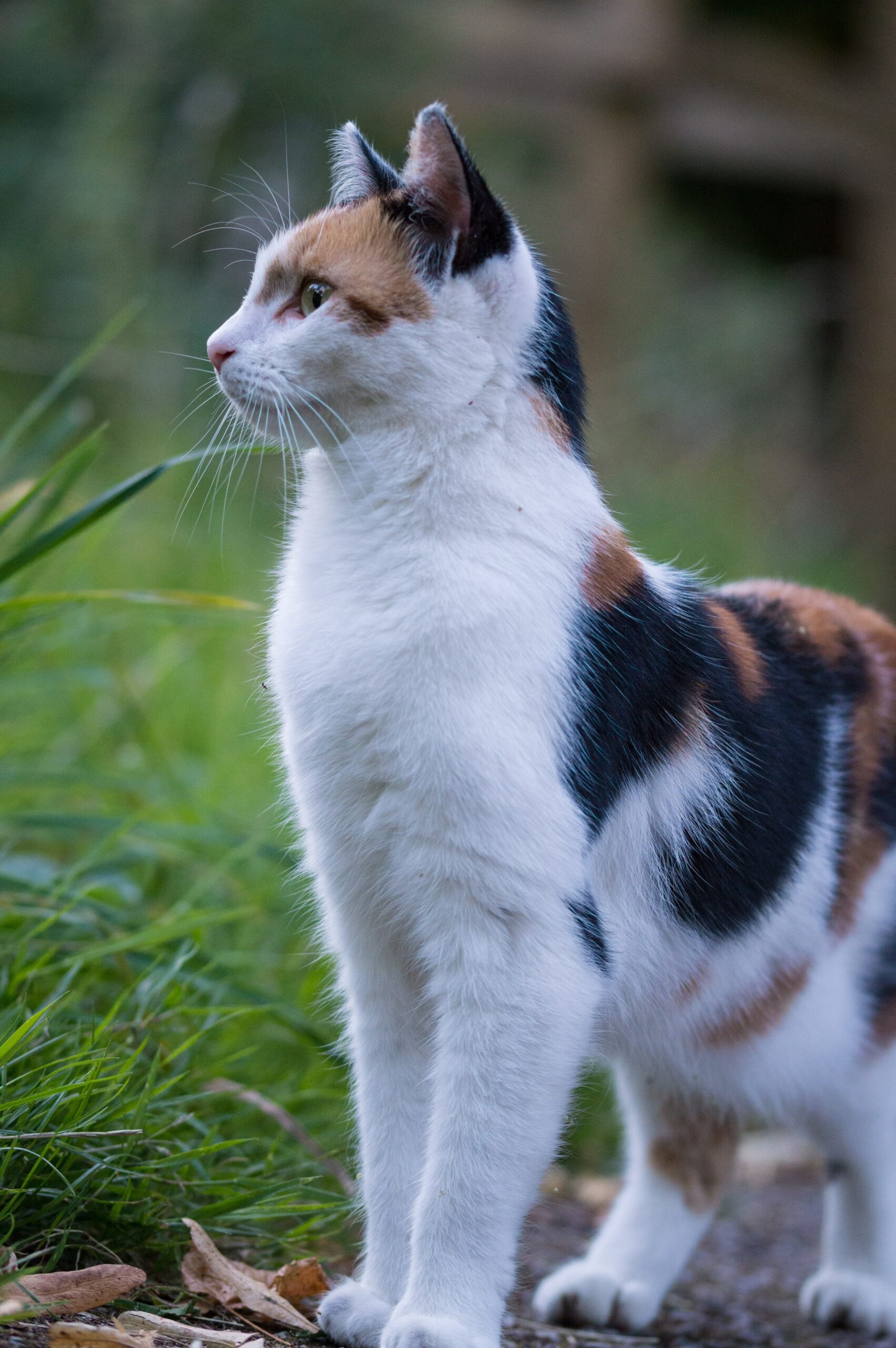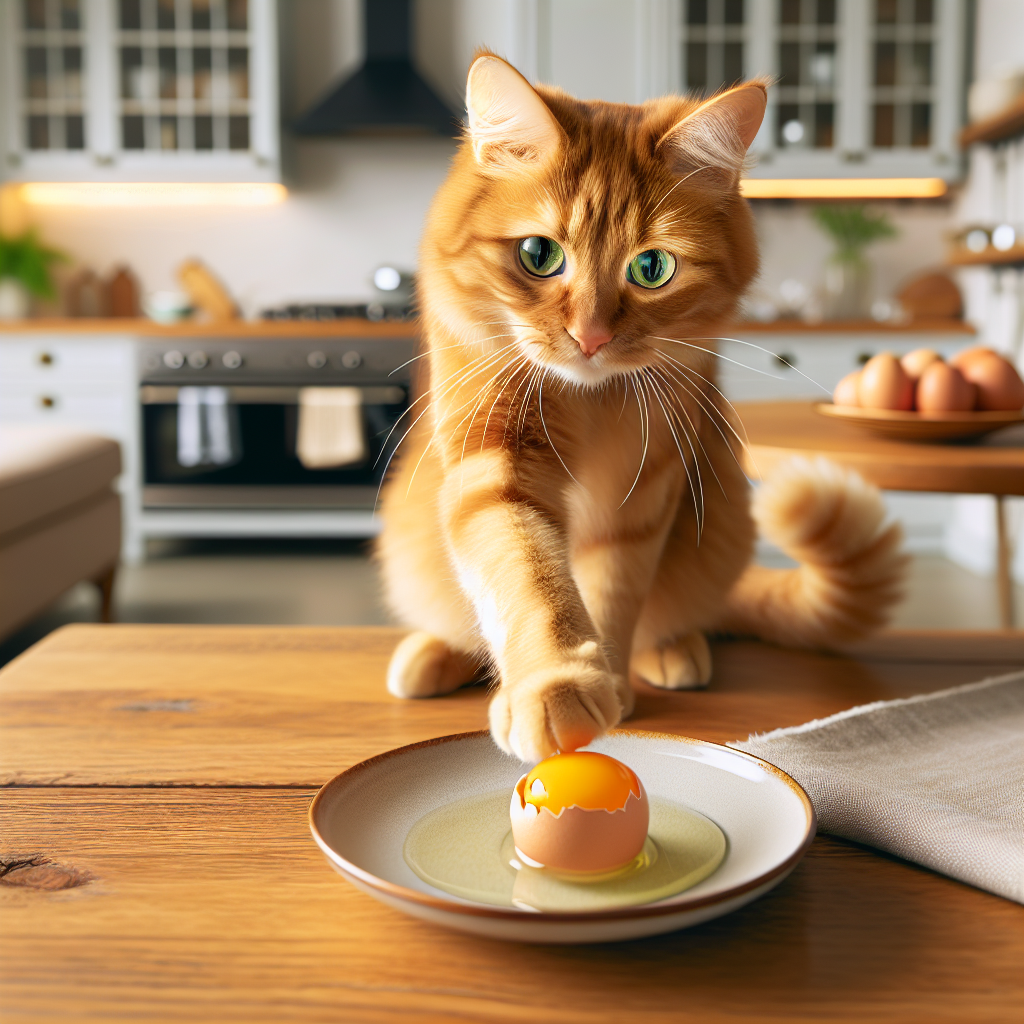Did you know that cats can actually eat eggs? Many cat owners wonder if eggs are a safe and healthy addition to their feline friend’s diet. In this article, we’ll explore the benefits and risks of feeding eggs to cats, as well as provide some guidelines on how to safely incorporate eggs into their meals. So, if you’ve ever found yourself pondering whether your cat can enjoy a scrambled egg breakfast with you, continue reading to find out!
How Eggs Benefit Cats
Cats can benefit from including eggs in their diet due to several reasons. Eggs are a rich source of protein, essential amino acids, vitamins, and minerals, all of which contribute to a cat’s overall health and well-being. Let’s delve into the specific ways in which eggs can benefit our feline friends.
Protein Content in Eggs
Protein is an essential component of a cat’s diet as it helps support the growth and maintenance of strong muscles. Eggs are an excellent source of high-quality protein, containing all the essential amino acids that cats need for optimal health. Including eggs in their diet ensures that cats receive an adequate amount of protein to support their bodily functions.
Essential Amino Acids
Amino acids are the building blocks of proteins, and cats require specific essential amino acids that their bodies cannot produce naturally. Luckily, eggs contain these essential amino acids, such as taurine, which is crucial for maintaining proper heart function and vision in cats. By incorporating eggs into their diet, cats can acquire these vital nutrients.
Vitamins and Minerals in Eggs
Eggs are a nutritional powerhouse, providing cats with a wide range of vitamins and minerals. These include vitamin A, which promotes healthy skin and coat, vitamin D, which aids in calcium absorption for strong bones, and vitamin E, an antioxidant that supports immune function. Additionally, eggs contain essential minerals like iron, selenium, and phosphorus, which play vital roles in a cat’s overall health.
Considerations Before Feeding Cats Eggs
While eggs can be a valuable addition to a cat’s diet, certain considerations need to be taken into account. It’s important to consult with a veterinarian before introducing eggs into your cat’s feeding routine, as individual cats may have specific dietary needs or health conditions that require attention.
Consulting with a Veterinarian
Before making any changes to your cat’s diet, it is always wise to consult with a veterinarian. They can provide personalized advice based on your cat’s specific needs and help determine if eggs are suitable for your cat. A professional opinion will ensure that you are making the best decision for your feline companion’s health and well-being.
Egg Allergies in Cats
Just like humans, cats can develop food allergies, and eggs are no exception. Allergic reactions to eggs can manifest in various ways, such as digestive disturbances or skin reactions. It is essential to monitor your cat’s response when introducing eggs into their diet. If any signs of an allergic reaction occur, it’s crucial to discontinue feeding eggs and seek veterinary advice.
Avoiding Raw Eggs in Cat Diet
Raw eggs may contain bacteria like Salmonella, which can be harmful to cats and humans alike. To avoid the risk of bacterial contamination, it is recommended to cook eggs thoroughly before feeding them to your cat. By eliminating the risk of bacteria, you can safely incorporate eggs into your cat’s diet without compromising their health.

This image is property of images.unsplash.com.
Cooked Eggs for Cats
Cooking eggs ensures that any potential bacteria are killed, making them safe for cats to consume. Here are some cooked egg options that you can consider when including eggs in your cat’s diet.
Boiled Eggs for Cats
Boiling eggs is a popular cooking method that can be easily prepared for your feline friend. Ensure that the eggs are fully cooked to eliminate any risk of salmonella contamination. Once cooled, chop the eggs into small, bite-sized pieces that are appropriate for your cat’s size before serving.
Scrambled Eggs for Cats
Scrambled eggs are another tasty and nutritious option for cats. Whisk the eggs thoroughly and cook them without adding any oils, seasonings, or additives. Once cooked, cut the scrambled eggs into small pieces that are easy for your cat to eat and enjoy.
Poached Eggs for Cats
Poached eggs can be a flavorful treat for your cat. To poach eggs, gently simmer them in water until the egg whites are fully cooked. Remove the poached eggs from the water, allow them to cool, and cut them into small, manageable pieces for your cat to savor.
Moderation is Key
While eggs can provide numerous benefits to cats, moderation is key when it comes to incorporating them into their diet. It’s important to consider the frequency of feeding eggs and the appropriate serving size for your cat to ensure a balanced and healthy diet.
Frequency of Feeding Eggs
Feeding eggs to cats should be done in moderation. It is typically recommended to offer eggs as an occasional treat rather than a daily staple. Incorporating eggs into your cat’s diet once or twice a week is generally considered a suitable frequency.
Serving Size for Cats
The serving size of eggs for cats depends on various factors such as age, weight, and overall health. As a general guideline, a small portion of one or two scrambled or boiled eggs is sufficient for an average-sized adult cat. However, it’s crucial to consult with your veterinarian to determine the appropriate serving size for your specific cat.

This image is property of images.unsplash.com.
Potential Risks of Feeding Eggs to Cats
While eggs can be a nutritious addition to your cat’s diet, it’s essential to be aware of potential risks. These risks include the possibility of Salmonella contamination and the potential for biotin deficiency if eggs are fed exclusively without a balanced diet.
Salmonella Contamination
Raw or undercooked eggs can potentially contain Salmonella bacteria, which can lead to foodborne illness in cats. To eliminate this risk, always ensure that eggs are fully cooked before feeding them to your cat. Thoroughly cooking eggs will kill any harmful bacteria and ensure the safety of your cat’s food.
Biotin Deficiency
Egg whites contain avidin, a protein that can interfere with the absorption of biotin, a B-vitamin essential for healthy skin, coat, and overall metabolism. However, feeding eggs in moderation and cooking them thoroughly mitigates the risk of biotin deficiency. By providing a balanced diet alongside eggs, you can ensure your cat receives the necessary nutrients for optimal health.
Signs of Egg Allergy in Cats
Just like humans, cats can develop allergies to certain foods, including eggs. It’s essential to be vigilant for any signs of an allergic reaction when introducing eggs to your cat’s diet.
Digestive Disturbances
If your cat is allergic to eggs, they may experience digestive disturbances such as vomiting, diarrhea, or gastrointestinal discomfort. If you notice any of these symptoms after feeding eggs to your cat, it’s important to discontinue their consumption and consult with a veterinarian.
Skin Reactions
Allergic reactions to eggs in cats can also manifest as various skin reactions, such as itching, scratching, or the development of rashes. These signs may indicate an egg allergy in your cat and should be addressed by a veterinary professional.

This image is property of images.unsplash.com.
Alternative Sources of Protein for Cats
If eggs are not suitable for your cat due to allergies or other concerns, there are alternative sources of protein that can meet their nutritional needs.
Meat-based Proteins
Cats are obligate carnivores, meaning their diets should primarily consist of meat-based proteins. High-quality commercial cat foods and specially formulated diets for cats typically provide the necessary protein content required for their well-being. Consult with your veterinarian to determine the best protein sources for your cat’s diet.
Commercial Cat Foods
Commercial cat foods often contain a balanced combination of proteins, vitamins, and minerals that meet a cat’s dietary needs. These foods are carefully formulated to ensure optimal nutrition and can be a suitable alternative if eggs are not a viable option for your cat. Always look for reputable brands and consult with your veterinarian for recommendations on choosing the right cat food.
Feeding Eggs as a Treat
Eggs can also be offered to cats as a special treat to provide them with variety and added enjoyment. Using eggs as treats can be a positive reinforcement during training sessions or simply to show your cat some extra love and attention.
Egg Treat Recipes for Cats
There are numerous egg treat recipes available that cater specifically to cats. These recipes often involve cooking eggs and combining them with other cat-friendly ingredients like mashed pumpkin or a small amount of cooked chicken. These treats can be homemade or store-bought, but always ensure that they are safe and appropriate for feline consumption.
Benefits of Using Eggs as Treats
Using eggs as treats for cats can be beneficial in multiple ways. Firstly, it provides a healthy and natural snack option that is packed with essential nutrients. Secondly, it can serve as a bonding experience between cats and their owners, reinforcing their relationship through positive reward-based interactions.

Feeding Eggs during Different Life Stages
The suitability of feeding eggs to cats may vary depending on their life stages. Kittens, adult cats, and senior cats may have different nutritional requirements and considerations when it comes to incorporating eggs into their diet.
Kittens and Eggs
Kittens have specific dietary needs for growth and development. While eggs can be beneficial, it is advisable to consult with a veterinarian before introducing eggs into a kitten’s diet. They can provide guidance on the appropriate timing and quantity of eggs to ensure the kitten’s optimal nutrition.
Adult Cats and Eggs
Adult cats can benefit from the nutritional value of eggs as part of a balanced diet. However, it is still important to consider the moderation and appropriate serving size mentioned earlier. By incorporating eggs into an adult cat’s diet, you can provide additional protein and essential nutrients to support their overall well-being.
Senior Cats and Eggs
Senior cats may have specific health concerns or dietary needs that require special attention. Before introducing eggs into the diet of a senior cat, it is highly recommended to consult with a veterinarian. They can assess the cat’s individual needs and provide guidance on whether eggs are appropriate and beneficial for their overall health.
Conclusion
In conclusion, eggs can be a valuable addition to a cat’s diet, providing a rich source of protein, essential amino acids, vitamins, and minerals. However, it is important to consider individual cat needs, consult with a veterinarian, and cook eggs thoroughly to eliminate the risk of salmonella contamination. By feeding eggs in moderation and incorporating them safely into a balanced diet, you can ensure that your cat receives the benefits of this nutritious food while keeping them healthy and happy. Remember, always prioritize your cat’s well-being and consult with professionals for personalized dietary advice.


